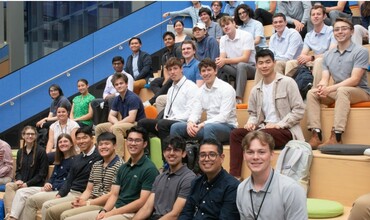The Draper Scholars Program emphasizes empowering students in 16 key research areas to make the greatest impact. We encourage applicants to align their research with these topics.
Cyber
Cyber-physical systems security is one of Draper’s core capabilities. Draper’s intimate knowledge of hardware and software vulnerabilities is used to both: (i) inform secure design decisions to protect the entire compute stack; and (ii) develop offensive capabilities. Draper’s approach is comprehensive and relies on research from formal methods, system security, advanced packaging, secure processors, and offensive cyber security.
Draper cyber-physical system security spans four broad, complimentary domains that use deep understanding of the hardware-software interface to develop solutions for some of our nation’s premier, strategically important systems.
Technical Point of Contact
Research Interests
Computer System Security
This research area covers security mechanisms, along with the associated compositional aspects, to protect the entire compute stack. We are dealing with strong, nation state adversaries, and our solutions must withstand the most sophisticated attacks. Thus, Draper is interested in collaborations that span a wide range of topics including:
- Secure processor design that includes methods to (formally) verify the (generated) hardware and its security properties (i.e., lack of side channel leakage, integrity and confidentiality of the computation, and reverse engineering and fault injection protections).
- Secure software stack design that includes secure firmware, operating systems and languages, property-based fuzzing, compiler transformations to enforce security policies, etc.
Formal Methods
Draper applies a wide range of formal methods to understand and then modify programs (in source code or binary form). Our analyses include static, dynamic, and hybrid approaches. We are interested not only in scaling and extending existing approaches but also creating languages and tool interfaces to make these analyses useful for others. Research topics of interest include:
- Specification composition/synthesis, proof automation (i.e., in Coq, Agda, etc.), counterexample guided inductive synthesis.
- Secure compilation, sound decomplilation, weakest precondition analysis, abduction inference, abstract interpretation.
- Mathematical topics (e.g., type theory, homotopy, category theory, program logics), hyperproperties, datalog/e-graphs.
Offensive Cyber Security
This research domain covers a broad area of offensive techniques at both the hardware and software layers. Specific areas of collaboration include:
- Reverse engineering and vulnerability research approaches and tool development, focused on cyber-physical systems.
- Novel hypervisor development for code protection, instrumentation, and code obfuscation techniques.
- Research into defeating hardware-based software protections within IoT/Embedded systems.
- Compiler-based techniques including automatic generation of exploits based on X-oriented programming, transformations to increase diversity and obfuscation (i.e., static and dynamic opaque predicates, etc.), taint analysis, control follow analysis, etc.
- Operating systems exploitation including via process injection, packer techniques, networking stack, etc.
- Analog-based attacks (i.e., RF, acoustic, power, etc.) and physical attacks AI-driven exploit campaigns, AI poisoning, etc.
Cyber Software and Artificial Intelligence
This recently established research domain takes a multidisciplinary approach to solving tough problems in cyber by harnessing the power of machine learning and artificial intelligence. Research topics plan to include:
- Building machine learning models that have the power to identify adversarial techniques tactics and procedures (TTPs) in network traffic, executables, and source code.
- Delivering cyber security to the edge via AI; this includes techniques for hardening IoT devices, military hardware and software, and space systems that automatically adapt to protect the high value assets.
- Leveraging LLMs to aid in the analysis of firmware, binaries, and malware, helping to alleviate some of the manual labor for reverse engineers.
Secure Compute Stack
Draper is interested in techniques to design, implement, and evaluate compute stacks that can guarantee security, safety, and reliability of the system – from transistors to applications – in the presence of adversarial attacks or natural occurring phenomena (e.g., radiation). This includes technologies to significantly scale formal verification of the entire compute stack, characterize side-channel (pre- and post-silicon), evaluate fault-injection resiliency, secure the boot process against quantum-based attacks, and perform circumvention and recovery.
Have Any Questions?
To learn more or stay up to date with our key areas, please fill out the below contact form.

